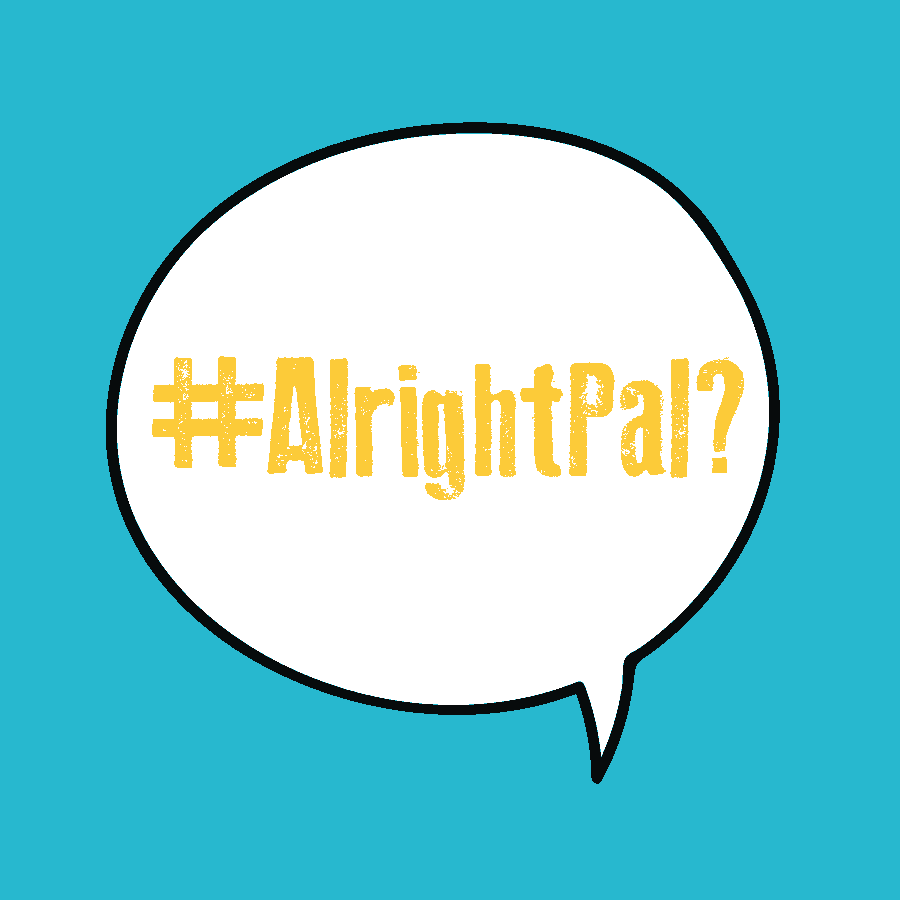Our #AlrightPal? campaign is all about starting the conversation around mental health and wellbeing.
Talking about mental health doesn't have to be scary. It's simply our emotional, psychological and social wellbeing. It's vital to understand and manage it as it affects how we think, feel and act.
If you’re concerned about your mental health and wellbeing, please know that you’re not alone. There are lots of support services available to help you during this time.
Mental health support in Barnsley
If you feel as though you’re in immediate danger call 999 and ask for an ambulance.
You can speak to your GP for support with your mental health, we also have a wide range of support services in Barnsley that can offer you advice, guidance, and care.
Health and care services
- 24-hour mental health helpline - Support and advice for your mental health. Call 0800 183 0558 or visit the South West Yorkshire NHS Foundation trust website.
- NHS 111 - Visit NHS 111 online or call 111 free from landlines and mobiles for mental health advice. The NHS also have a site called Every Mind Matters which gives advice.
- NHS Barnsley Talking Therapies - supports people to get fast and easy access to the best type of therapy. Visit the Talking Therapies website.
- Togetherall - Unique Mental Health Service offering an anonymous and safe support community, moderated by professionals and counsellors. Visit the Togetherall website.
- SSAFA the Armed Forces Charity - Support carers both regulars and reserves in the Royal Navy, The Royal Marines, The British Army and the Royal Air Force and their families including anyone who's completed National Service. Visit the SSAFA website.
- Op COURAGE - The Veterans Mental Health and Wellbeing Service. Op COURAGE is an NHS mental health specialist service designed to help serving personal due to leave the military, reservists, armed forces veterans and their families. Visit the Op COURAGE website.
- Mind Sheffield: Keeping Families in Mind. Support for military families and Armed Forces Support National. Visit the Mind Sheffield website.
Mental health charities
- Samaritans of Barnsley - A 24-hour support service for your emotional wellbeing and mental health. Call 116 123, visit the Samaritans website or email jo@samaritans.org.
- Papyrus – A youth suicide prevention charity providing free 24-hour advice. Call 0800 068 4141 or text 07860 039967.
- Mind - A national charity with a local service to support people with mental health. Visit the Rotherham and Barnsley Mind website.
- Team Talk- A mental health programme run by Barnsley FC Community Trust. It supports men’s mental wellbeing through peer support, sharing experiences, tips and coping mechanisms. Visit the Barnsley FC Community website.
- Barnsley Support Hub- offers a free out-of-hours mental health crisis service for over 18s. Support is available virtually or in person without the need for a referral or appointment. Visit the Barnsley Support Hub website.
- Compass Be Mental Health Support Team (MHST) - works with children, young people, and families in education settings in Barnsley. They provide free, confidential support, help and advice. This is for pupils, students and schools for issues related to mental health and emotional wellbeing. Visit the Compass website.
- Survivors of Bereavement by Suicide - a national charity that provides support to adults who’ve been bereaved by suicide. Visit the Survivors of Bereavement by Suicide website, email barnsley@uksobs.org or call 0300 111 5065.
Local support groups
- Amparo - support for anyone affected by suicide. Visit the Amparo website, email amparo.service@listening-ear.co.uk or call 0330 088 9255.
- Barnsley Mind - host a thriving communities project to support people feeling lonely in Central, Kingstone, Dodworth, Stairfoot and Worsbrough area. Call (01226) 211188, or email contactus@rbmind.co.uk.
- Exchange Recovery and Wellbeing College, offers a variety of informal courses that are run in small groups and are open to anyone. Visit the Exchange Recovery and Wellbeing College.
- Creative Minds - run projects to develop people's mental, physical and psychological wellbeing. Visit the Creative Minds website.
- Andy’s Man Club - runs free sessions where men over 18 can come together and offer each other peer-to-peer support. Visit the Andy's Man Club Barnsley Facebook page for more details.
- Creative Recovery - uses creativity to support mental health and recovery, boost well-being, build communities and bring about social change. Visit the Creative Recovery website.
Looking after your own mental health
There are lots of things you can do to improve your mental wellbeing, such as:
- Staying active – visit the What’s Your Move website for ideas local to you.
- Connect – enjoy time with family and friends or join a community group to meet new people. Visit Live Well Barnsley for local groups.
- Learn something new – trying out a new hobby or learning a new skill can be a good way to meet new people with similar interests. Visit Live Well Barnsley to find ideas and activities.
- Enjoy time outdoors – visit our free local attractions to enjoy what the borough has to offer. Find out more on the Barnsley Museums website.
Looking out for others who may be struggling
If you’re worried about someone who might be having mental health issues or suicidal thoughts, there’s lots you can do to support them. Take a look on the Samaritans website for signs when someone is struggling, what you can do to help them, when you should get help from someone else and tips for taking care of your wellbeing.
Need help now?
If you're in immediate danger and need an ambulance

